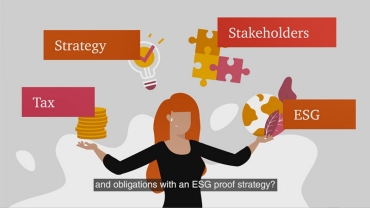
DAC7 legislative proposal to Dutch House of Representatives
29/03/22
On 23 March 2022, the legislative proposals regarding the automatic exchange of information for digital platform operators was presented to the Dutch House of Representatives. The legislative proposal is an implementation of the previously adopted EU Directive (DAC7 expanding the scope of automatic exchange of information to EU and non-EU digital platform operators (“DAC7” or “Directive”).
The legislative proposal has been open for consultation. Compared to the consultation documents, the legislative proposal contains a number of clarifications. The legislative proposal also makes clear that the Netherlands intend to interpret the Directive in accordance with the OECD Model Rules for Reporting by Platform Operators with respect to Sellers in the Sharing and Gig Economy (OECD-model rules).

What does this mean for your organisation?
If your enterprise is a digital platform operator, you will need to collect, verify and report information on the sellers on your platform. This requires solid processes and possibly also adjustments to your systems. The collected and verified information must be reported for the periods as of 1 January 2023. This also includes information on payments to and from sellers. You will also have to share this information with the sellers themselves on an annual basis.
We refer you to our webpage “Taxation of the digital economy” which deals with the full end-to-end process: from identifying the exact impact of DAC7 on your business to navigating the implementation of your compliance framework and digital infrastructure.
DAC7 in a nutshell
The new rules introduce standardised reporting requirements for digital platform operators. The new reporting obligations will apply to operators of digital platforms that allow certain sellers (“Reportable sellers”) to be connected, directly or indirectly, to other users in order to perform the following activities:
- the rental of real estate;
- the provision of personal services;
- the sale of goods; and
- the rental of any mode of transport.
It is crucial that the relevant activity is performed in return for a consideration, the amount of which is known or can reasonably be known by the platform operator. Platforms can also be in scope if they offer the activities in their own name, but have the activities carried out by underlying sellers.
In addition to these new reporting obligations for digital platform operators, the legislative proposal contains two other amendments to the DAC framework. The first amendment is that it will be made possible for the Dutch Tax Authorities to conduct a ‘joint audit’ during which multiple EU tax authorities investigate the same taxpayer. The second amendment is that the legislative proposal contains rules that must guarantee the privacy of the person whose data is being reported, collected and exchanged.
Observations Dutch implementation of DAC7
Interpretation in accordance with OECD
The bill clarifies that the Netherlands will interpret the bill in accordance with the current and future interpretation of the OECD Model Rules, unless this interpretation is clearly not in line with the Directive. This in order to develop a level playing field between EU and non-EU platform operators.
PwC Observation: Based on the above, it appears to be up to the OECD to provide more clarity on the interpretation of a number of key concepts. It is remarkable that the legislator explicitly states that in most cases the future interpretation of the OECD will be followed. Although this may be beneficial to (cross-border) uniformity, it will lead to more legal uncertainty and unpredictability for platforms in scope.
In addition, the bill already contains a number of relevant clarifications with respect to the consultation documents. We would expect that these clarifications will relate to (future) OECD guidelines.
Services offered to different users at the same time
The concept of 'personal services' covers a wide range of services, such as transport and delivery services, tutoring, cleaning, gardening, or handyman work, or administrative, legal or accounting tasks, provided that these are carried out at the specific request of a user. The bill clarifies that a specific request by a user can be one-on-one, but can also be of a more impersonal nature. It is important that the personal service is, at least to a certain extent, adapted or can be adapted to the wishes of the user.
Services that are offered simultaneously by one seller to several users, such as online language, music or sports lessons or performances, can also qualify as a personal service if each individual user can influence the service. Thus, in order to be in scope of DAC7, the personal service must to a certain extent be adaptable to the user's wishes.
PwC Observation: Based on these clarifications, video and music streaming services appear to be out of scope of the bill. Many other services do fall within the scope. In particular, online providers that offer services from or make use of independent contractors (in Dutch: “zzp'ers”) will often be in scope. Services provided by employees of a platform are not in scope.
Transactions consisting of several elements
If a transaction consists of several elements, these different elements may have to be reported separately. According to the bill, it is relevant whether the activities can be split up or whether one element of the transaction is strictly subordinate to the overall transaction.This test seems to be derived from the VAT doctrine 'unity of performance'.
Seller verification requirements
In order to determine whether a seller is a reportable seller, platform operators must collect and verify specific information about the sellers that use their digital platform.
If a seller does not cooperate and does not provide the required information after two reminders following the initial request, the platform is required, after 60 days have passed, to close the seller's account and prevent that seller from re-registering on the platform or to withhold payment of the consideration as long as the seller has not provided the required information.
PwC Observation: The consultation documents suggested that closing or blocking the account of non-cooperating sellers is not mandatory. It is now clarified that this is actually mandatory. The proposal also emphasized that in order to give the seller sufficient time to comply with his obligation the platform operator should not take above-mentioned actions earlier than after a period of 60 days have passed.
Register for excluded platforms
If a platform does not have any reportable sellers, the platform is excluded from reporting. According to the legislative proposal, the European Commission will set up a central register of excluded platforms. This will allow the competent authorities of the other Member States to assess if a platform is excluded from reporting. Excluded platforms will therefore only have to demonstrate in one Member States that they do not have any reportable sellers.
Active media campaign
According to the legislative proposal it is currently not always clear to users of platforms how income earned through a platform needs to be reported in their tax returns. The Dutch Tax Authorities will therefore launch an active media campaign on this topic. As part of this campaign, the Dutch Tax Authorities also plan to work together with a number of platforms.
PwC Observation: Given the broad scope of DAC7, we believe it is a positive development that the Dutch Tax Authorities want to work together with a number of platforms on this topic. Sellers need to know which tax obligations they have and at the moment this is not always clear.
Fines and penalties
According to the legislative proposal, DAC7 is a tool to combat tax avoidance and to maintain a level playing field for platforms. Therefore, wilful misconduct or gross negligence of the obligations under DAC7 may result in penalties of the 6th category, which is currently maximized to EUR 900,000.
These are maximum penalties and penalties imposed should always be proportionate. What is considered proportionate depends on the specific facts and circumstances and is at the discretion of the tax inspector.
Switch-off mechanism
The Directive allows other (non-EU) countries to join in the automatic exchange of information, but only when a number of requirements are met (so-called “adequate arrangements”).
According to the legislative proposal, a committee appointed by the European Commission will determine whether there is an adequate agreement between an EU member state and a non-EU member state and as such, whether an exchange of equivalent information takes place.
PwC Observation: When non-EU countries join this initiative, platforms will also have to collect, verify and report information on non-EU sellers.
Operational guidance
Further guidance, including guidance on the collection and verification requirements and reporting requirements, will be provided through a separate Explanatory Memorandum.
PwC Observation: We must now wait for more operational guidance. Based on experience with similar legislation, we do not expect this guidance to be published any time soon. Given the complexity of DAC7, this should not stop platforms from making a start with adjusting their processes and systems.
What happens to the reported data?
The Dutch Tax Authorities may use the reported data to get a better view on the sales-and services activities that take place within the Netherlands.
Furthermore, the Dutch Tax Authorities will automatically exchange the obtained data with all other EU tax authorities via a standardized digital network (CCN network). At the same time the Dutch Tax Authorities will also receive information from all other EU tax authorities that may be relevant for taxation in the Netherlands .
Via the CCN network often privacy-sensitive information is exchanged. The legislative proposal provides more clarity on how to deal with privacy-sensitive information.
PwC Observation: The reporting obligation under DAC7 is not limited to cross-border relevant activities, but also applies to activities that take place exclusively within the Netherlands. Small businesses, self-employed individuals and individuals who regularly offer goods or services via digital platforms may come under increased scrutiny by the Tax Authorities.





















